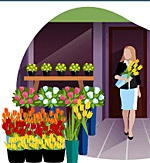Healthy Seedlings Mean Healthy Plants
 Special to Road Trips for Gardeners
Special to Road Trips for Gardeners
“Really healthy plants start with really healthy seedlings,” explains John Kempf, a lifelong Amish farmer. As founder and CEO of Middlefield, Ohio-based Advancing Eco Agriculture, Kempf specializes in optimizing plant health and soil biology to increase the yield, nutrient density and shelf life of crops.
“Most seedlings today are grown for appearance rather than utility,” Kempf says. “Instead of buying the largest seedlings, get the ones with the shortest, sturdiest stems.” For example, tomato seedlings should be 6 inches, not 12 inches, tall. If the upper part of the plant becomes too big for the root system, the roots won’t be able to get enough water to support the top of the plant, resulting in transplant shock.
A biological fertilizer such as compost tea, liquid seaweed, kelp meal or alfalfa meal should be introduced into the hole at planting or transplanting. This will provide minerals to the plant and enhance soil biology.
“The first three weeks after planting are absolutely critical for best performance,” notes Kempf. This includes proper watering and protection from frost.
Seedlings are frequently transplanted too deeply, which can lead to rot or fungus on the stem. Seedlings should be planted at the same depth as they were at the greenhouse; don’t bury the stem. The only exception is tomatoes.
Do not use pesticides prophylactically; only use them if and when you have a challenge. (“Pesticide” encompasses insecticides, herbicides and fungicides.) Pesticides actually make your healthy plants unhealthy. Just applying pesticide triggers a different kind of plant metabolism that will attract disease and insects.
(Orchard photo courtesy of Advancing Eco Agriculture)






